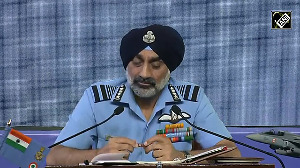On to the question of energy. Yes, it is abundantly clear that India is getting to be increasingly energy-deficient. India's hyper-active petroleum czars have been out there beating the bushes for good deals in hydrocarbons everywhere from Iran to Venezuela to the Sudan to Khazakhstan, with mixed results. There's a serious problem: India's projected growth rates will be seriously affected if energy is not available.
But this is an opportunity as well as a threat. Just as India leapfrogged generations of technology in telecommunications and went direct to wireless, at a huge saving in sunk cost, would it be possible to bypass expensive intermediate stages and move to what makes the most sense for India in the long run? After all, every year India is getting more and more addicted to hydrocarbons; America and others have demonstrated that this crack-like addiction is not good for any nation due to economics and geo-politics.
Is nuclear power the answer, then, to India's energy problems in the next decade or so? It is hard to believe this is the case, at least not conventional enriched-uranium technology. In the wake of Chernobyl, Three Mile Island, Sellafield and other disasters and environmental catastrophes, it is not clear that India should depend on dodgy western reactor designs.
Apart from their questionable safety records, there is also the question of the supply of nuclear material, particularly enriched uranium. India does not have large deposits of uranium ore. So if India goes in for this technology, it will forever be tied to the apron-strings of Western suppliers. And let us take a look at their past history of reliability. The Canadians cut off supplies when they decided that India had diverted material from an experimental CANDU reactor at Trombay.
And then the Americans. They had an agreement with India to supply reactor fuel to the Tarapur nuclear reactor till 1993. This agreement had the weight of an international treaty, but the Americans unilaterally abrogated this treaty; and they never resumed the supply of fuel to it despite thirty years of wrangling. Supplies of anything strategic from America can be, and will be, held hostage to domestic power-plays in the US, including the muscle-flexing of religious fundamentalists.
So it is hard to trust these suppliers as their geopolitical compulsions are outside the scope of what India can control. To be at their mercy would be no better than to be at Pakistan's mercy with the brain-dead Iran-Pakistan-India gas pipeline that is popular in certain quarters. What we are seeing here is supplier power in action, the obverse of the buyer power that India ought to be exerting. Cartels like OPEC and NSG are able to hold their hapless customers hostage to their whims and fancies.
There are also certain Orwellian terminological games played by Americans. There is one Stephen Cohen, proclaimed to be an American 'expert' on 'South Asia'. He recently made the startling comment that India is a serious proliferator. Cohen is indulging in nomenclature terrorism. The dictionary definition of proliferation is the act of shipping fissile material to other nations (especially dangerous, rogue nations). This is what China does on a regular basis, blatantly.
But according to Cohen and other 'experts', India is a major proliferator despite never once having shipped material to third countries. Deciphering Cohen-speak, what he means by 'proliferation' is India's indigenous development of nuclear technologies despite crippling embargoes. This reminds me of the story from the Panchatantra where several colluding thieves convince a simpleton who's taking his goat to market that it's not a goat but a dog, using the simple expedient of 'truth by repeated assertion.'
And that brings us to the crux of the matter. This is the fast-breeder technology that shows signs of being almost ready for commercial production. It has tremendous implications for India. For one, India is apparently at the forefront of this technology. Second, India has practically limitless natural resources to sustain this technology, in the form of the mineral coastal sands of Kerala. India has fully 31per cent of the world's known reserves of thorium. Since the reactor produces more fissile material than it consumes, this is a sustainable technology.
The target of the Indo-US agreement, therefore, is the Prototype Fast-Breeder Reactor at Kalpakkam, Tamil Nadu. The rest is all fluff, mere diversionary tactics.
It may well be the case that India is close to a commercial breakthrough on this leapfrog technology that renders the entire Nuclear Supplier Group redundant; hence it is important for the NSG to understand and preferably kill off the programme so that they can protect their awesome supplier power. Any bets that this is the sole reason behind the Bush administration's recent interest in palavering with India?
In that case, all the more reason to play hardball with Americans: they need the agreement more than India does, but the Indians, not being skilled game theorists and negotiators, are blowing a perfectly good poker hand and folding too soon. The fast-breeder reactor is a splendid bargaining chip: how many F-16s and P-3C Orions and what other goodies will they bid in order to get a look at this?
But I have another major concern: I am uncomfortable with the safety factor with nuclear power of any kind. It is not known how well the fast-breeder reactor will come out in the safety department, and therefore it behooves us to do a decade's-worth of testing before letting loose these monsters on unsuspecting civilians.
The only answer really is solar power. India is blessed with abundant sunshine for 300 days out of the year, and if it could be turned into electricity, India would instantly be one of the most energy-rich nations of the world. Therefore, India needs to put a crash programme in place, something like the Manhattan Project or the Man-on-the-moon-by-1969 programme, something that captures the public's imagination and involves turning the full creative energy of the nation's laboratories to the task.
And there is no time to waste. For, Indians are used to the boffins beavering away in the nation's defence and CSIR laboratories who eventually reverse-engineer whatever technology has been denied to India -- supercomputers, cryogenic rocket engines, high-performance aircraft engines, etc.
But that is no longer going to be the case. In an unintended consequence of globalisation and knowledge process outsourcing, science graduates who in the past gravitated towards the national laboratories now have other options to pursue far more lucrative and interesting work at labs that belong to MNCs. They are quitting the CSIR labs; they are even quitting the ISRO and other state-of-the-art labs and joining the likes of GE's John Welch lab in Bangalore.
Thus, it cannot be taken for granted that Indian boffins will eventually figure it out.
It is clear that the West has no major use for solar power -- just as their pharmaceutical companies refuse to do any research into tropical diseases, dismissing them as low-profit -- and so there will be no innovation coming out of America or Europe in the area of photo-voltaics. If anything does come up, Exxon and General Motors will buy up and kill them because their co-specialised assets are so large. It is India that has the incentive (no hydrocarbons, burgeoning import bill, no uranium, less investment in hydrocarbon infrastructure) and the skills to do it.
There is one final reason to cast a jaundiced eye over the proposed Indo-US nuclear deal. Let us set aside the concerns about one-sidedness and unilateral Indian commitments in exchange for vague American promises. The fact is that the Bush administration is in trouble. Indeed, some people are talking about 'lame ducks', which is extraordinary in the early years of a presidency. In the wake of the Katrina disaster, the rejuvenated Democratic Party is feeling its oats, and there is even some talk of a possible capture of the White House by -- unlikely though it will be -- Hillary Clinton.
Furthermore, the Bush White House is rife with scandal among top advisers as well as senior Republicans. Key strategist Karl Rove is under criminal investigation for having blown the cover of a CIA operative. House Majority leader Tom DeLay was indicted for violating campaign laws in Texas. Senate Majority leader Bill Frist is being investigated for insider trading.
There is a bruising battle ahead for Bush's new Supreme Court nominee, Harriet Miers. George Bush's latest popularity numbers are at historic lows of 31%. These guys have their backs to the wall.
Given all this, just about the last thing the Bush administration will be willing -- or able -- to do is to twist arms to get a controversial bill through Congress that Atlanticists and non-proliferation fundamentalists such as the New York Times trumpet as a cave-in to Indian pressure and a violation of the purity of non-proliferation dogma.
So the Indo-US deal has just about a snowflake's chance in hell of getting through the US Congress. Indian negotiators should extract their pound of flesh from Nicholas Burns; since this agreement is not likely to be ratified anyway, there is no harm in taking extreme positions just to see how far India's bargaining power will go before the Americans just walk away from the deal. It is important to calibrate buyer power, and it is best to do it when you know the bargain is not going to be struck at all.





